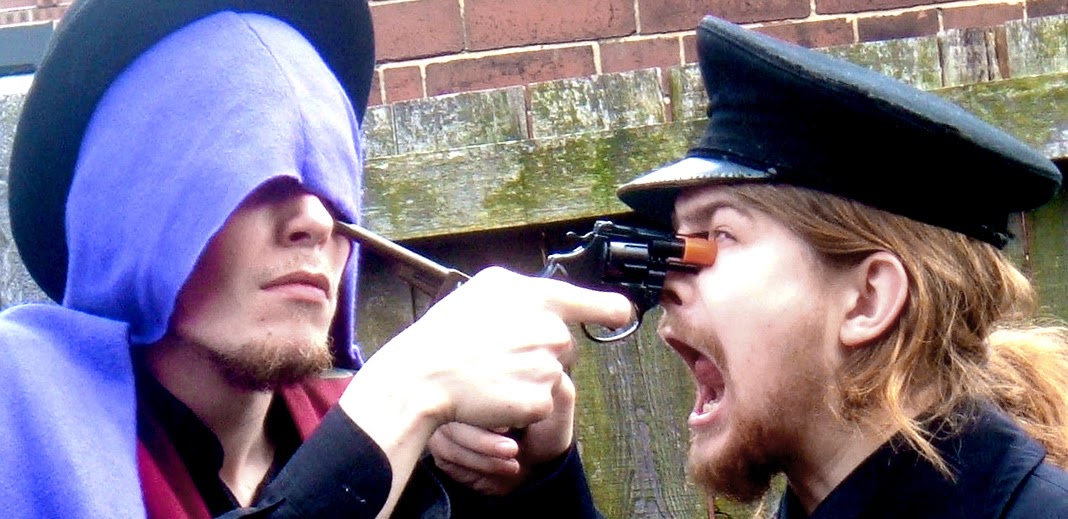Dear readers, my 2013 was not wholly devoted to the viewing of old films, nor was my writing restricted to the comments made on this blog. With Tom Hagley, I worked on some fiction of my own - or perhaps that's poorly phrased. Crucially, an assortment of short stories came together. An anthology. An E-BOOK!
What are its attributes? It's short, it's exciting, and it's full of ghosts and talking animals and forgotten former prime-ministers. International adventure, historical catastrophe, Old Testament fan-fiction, that sort of thing. Most of all, it's dirt-cheap. Much as I'd like to regurgitate the blurb, and sell the thing to you, this blog was never about adverts, it's about stories and history and where things come from. Instead, let's ask: who were the Fez of Etymology?
 |
| ...by Ben Swithen and Tom Hagley |
Thankfully each episode was better than the one before it. Livelier, more energetic, more inventive. On reflection the opening pair had very little to recommend them, and it's unsurprising that our audience was few. Nonetheless, when the series were played on Radio KoL, Jick, the creator of fledgeling RPG The Kingdom of Loathing, enjoyed it enough to name an in-game item after the eponymous Fez.
 |
| with Dan Bloor, the neglected third member of the early Fez |
We wrote a play, which was never staged, though it exceeded the merits of our audio adventure by dint of having a plan and a plot. It was to have been called 'The Fez of Etymology presents Jules Verne's Journey to the Centre of the Earth, based on Around the World in Eighty Days by Jules Verne', and rehearsals co-starred singer-songwriter Tom Hollingworth, adult actress Masie Dee, and a giant talking goose, named Goosey.
There followed a couple more seasons of audio-drama - 'The Mundane Egg', which was really quite good, but better in the memory; and 'Darius Cantor Must Die', a huge saga which no listener could bear, which saw us abandon silly comedy for silly drama and epic fantasy. I'm inclined to think it had true greatness under its flabby folds, but my recent attempt to novelise it proved impossible. Its merits are lost to time.
 |
| Tom's poster for Tamburlaine |
After that, Tom and I worked together on the start of many projects, but nothing held our attention. We went our separate ways. The best of our ideas had been an anthology of short stories, but who would publish such a thing: odd short stories by two unknowns? This was before the world cared about ebooks. When our tenth anniversary rolled around in 2013, I suggested we get together and make a short film. Some lively ten-minute runaround on Youtube, possibly about Cromwell. It became apparent that this could never happen. We lived too far apart - or Tom did, at least. But this was the age of the Kindle and the Kindle-analogue. The stories could come alive again - indeed, in my mind the idea had never quite gone away. We could self-publish - perhaps a vanity, perhaps a practical way to find one's own audience.
So here it is at last, the ultimate fruit of the Fez of Etymology. 'The Fez of Etymology and Other Stories'. Our submarine tale is in there, or at least its skeleton, revivified and clad in curious meats. Likewise Das Security Bathroom, which started life as a thirteen-minute Fez movie. The other nine stories are new, for this is neither an exercise in recycling nor nostalgia. Some of the characters hail from our audio and stage-work, most obviously Master Smith, a shard of Tom. Characters we cared about, and ideas we didn't want to see trashed, can outlast those over-compressed mp3s. Short stories are beautiful things: they're short, and they're stories.
 |
| Master Smith and Bandagongo, in 2008 |
The book is now available from amazon.com, amazon.co.uk, amazon.ca, amazon.de, and all those regional amazons. Readers, this ebook can be bought for yen!
